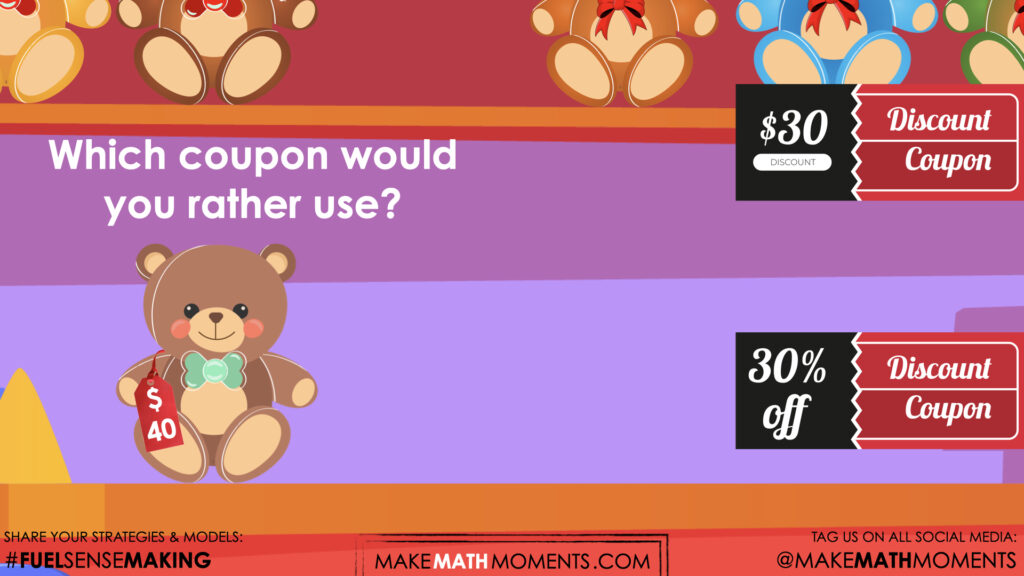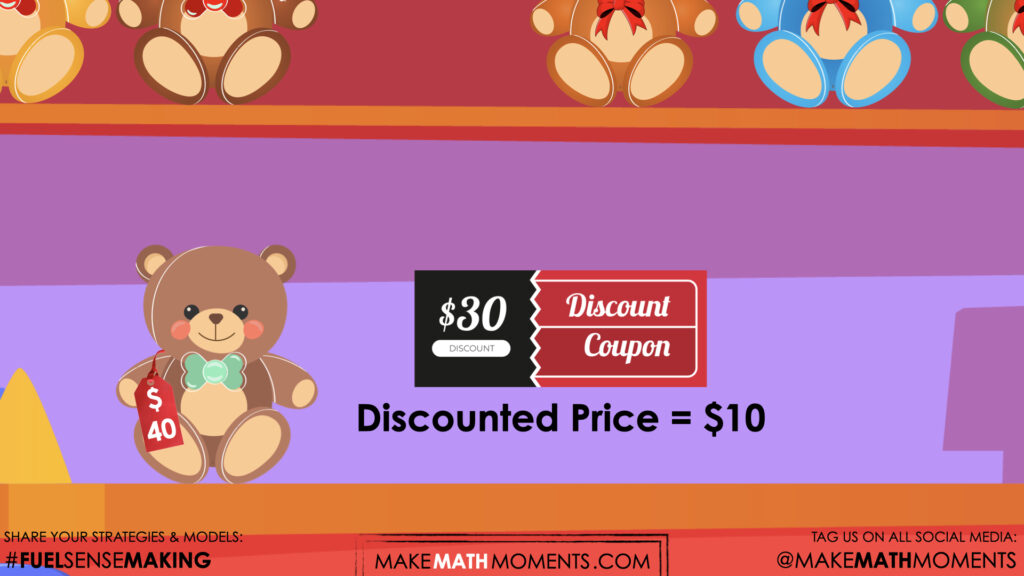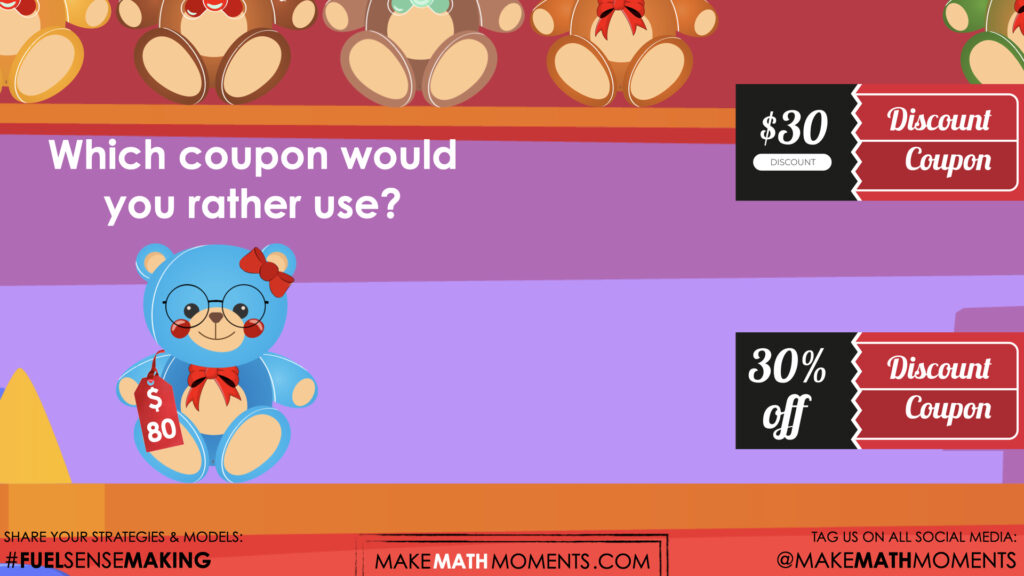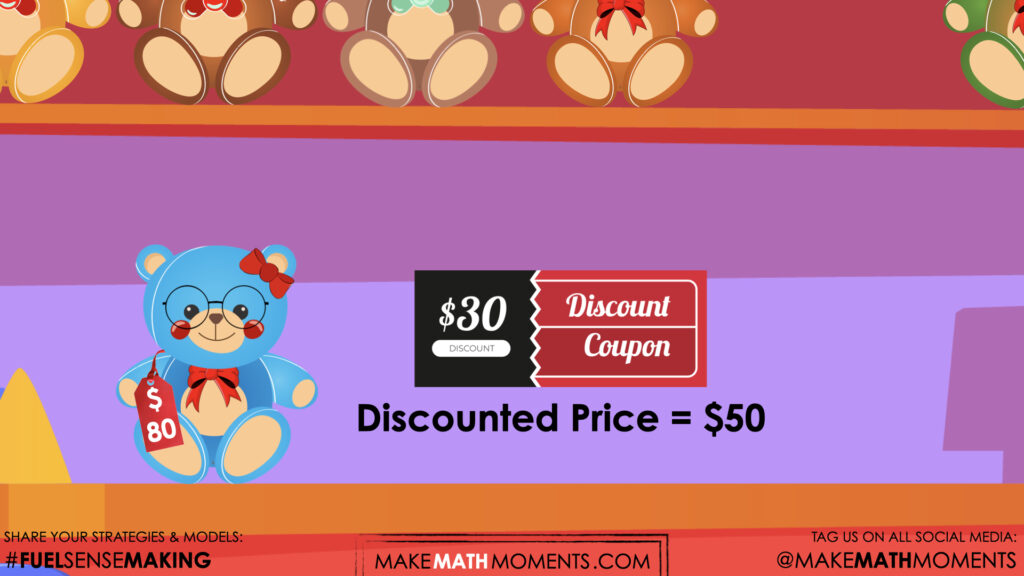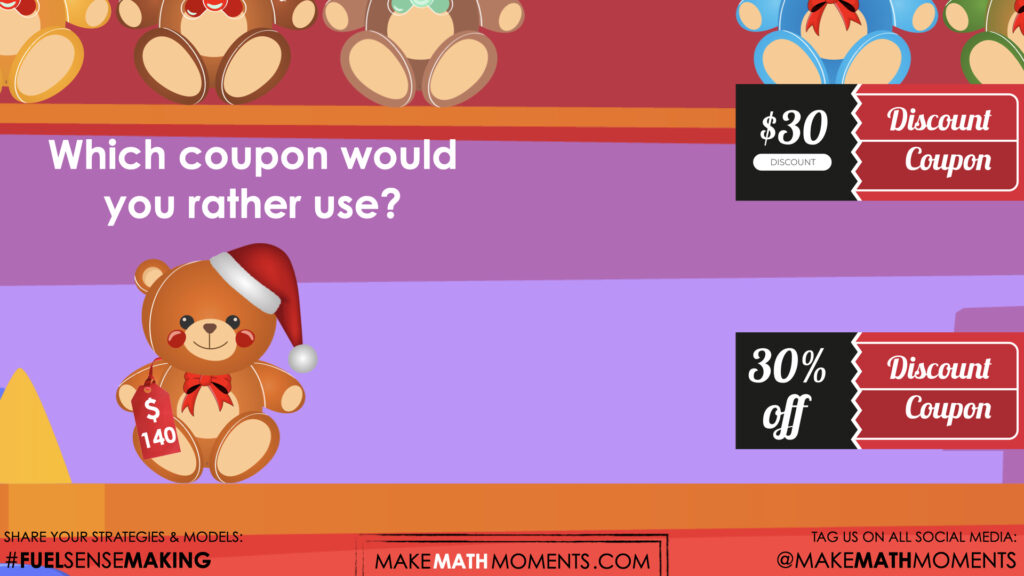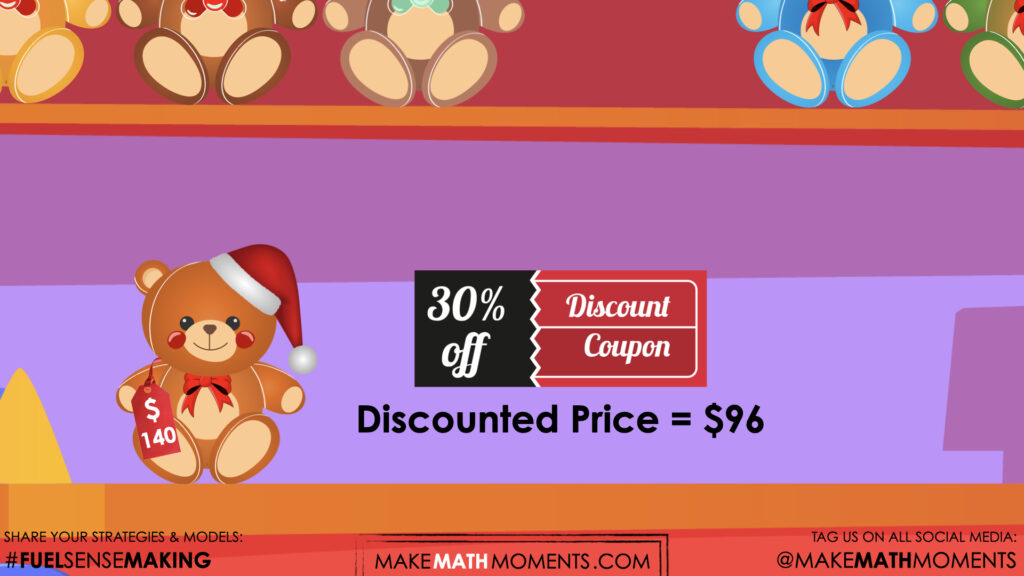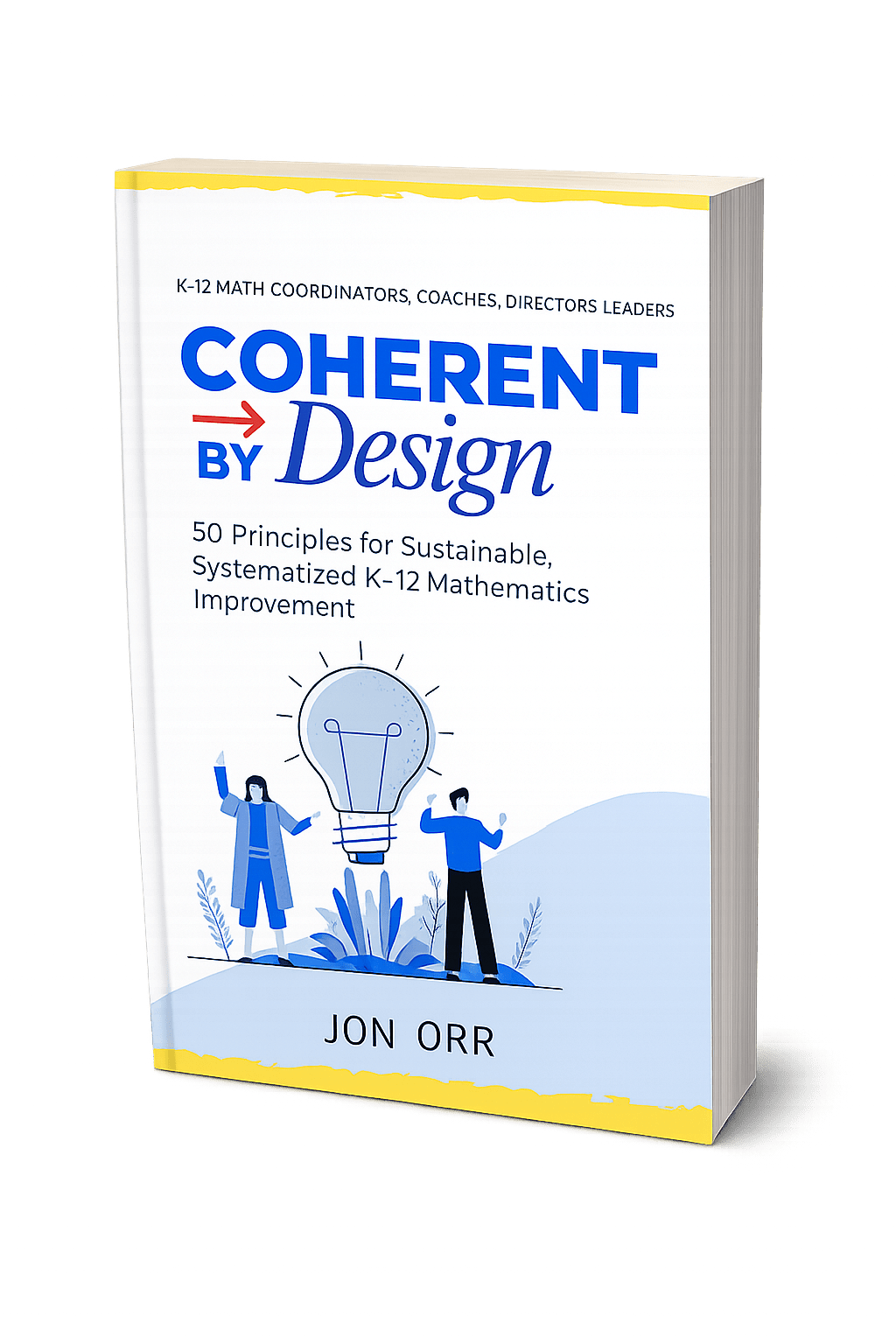BEAR BUILDER [DAY 4]
CALCULATING PERCENT
Create and draw bears that vary in size
Intentionality
Math Talk
Visual Math Talk Prompt #1
Visual Math Talk Prompt #2
Visual Math Talk Prompt #3
Visual Math Talk Prompt #4
Visual Math Talk Prompt #5
Purposeful Practice
Resources & Downloads
Educator Discussion Area
Intentionality & Unit Overview
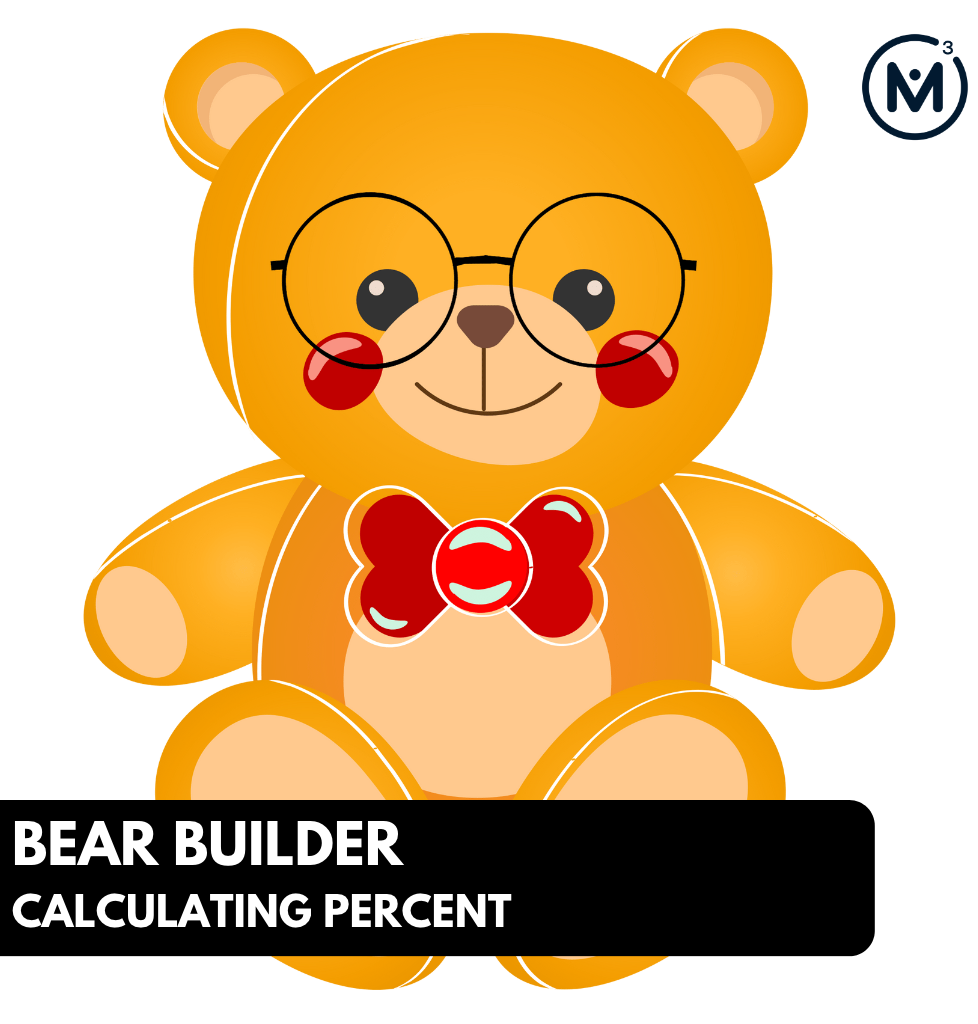
Length of Unit: 5 Days
Access each lesson from this unit using the navigation links below
Students will explore modelling and solving proportional reasoning problems that relate to percent using a variety of strategies along a double number line. Students will engage in a math talk that poses a dilemma of which coupon to use: a 30% off coupon or a $30 off coupon.
Intentionality…
The purpose of the Day 4 activities is to reinforce key concepts from Day 3. Students will engage in a string of related problems through a math talk and will have an opportunity to complete independent purposeful practice. The math talk and purposeful practice serve to develop a deeper understanding of the following big ideas:
- Percent is a comparison measured out of 100;
- decreasing by a percentage will lower the original value.
- increasing by a percentage will increase the original value.
- A percentage decrease, followed by a percentage increase of the same value will result in a change of value.
- Reducing a value by 20% is the same as retaining 80% of the value.
- Increasing a value by 20% is the same as 120% of the original value..
- To solve percent related problems we can use the following strategies:
- Analyze Between and Within Ratios (Scaling Up or Down);
- Find a Unit Rate
Math Talk
Present the following percent problems one at a time (use the visual prompts). Encourage students to first predict which coupon will create the better deal and then have them determine which coupon is the better deal.
As you and your class work through these problems some students will start to make predictions on which price is the “it doesn’t matter price”. Hold back on confirming these predictions with your students. Encourage your students to prove any hypothesis they might have.
Would you rather use:
a $30 off coupon or a 30% off coupon.
Bear #1: $40
Bear #2: $80
Bear #3: $140
Bear #4: $96
Bear #5: $250
Consider watching this silent solution animation to help you prepare to facilitate this math talk utilizing a double number line to model possible solutions.
Visual Math Talk Prompt #1
Show students the following visual math talk prompt and be prepared to pause the video where indicated:
Then ask students:
Which coupon would you rather use?
Similar to Day 1,2, and 3 of the Bear Builder problem-based unit, students may use a benchmark strategy to find 10%.
Since we are aiming to build fluency and flexibility working with percent by using multiplication and division we are going to ensure students are not leveraging the calculator as a tool.
As the facilitator, we are going to do our best to work from a double number line to highlight the strategies students use to determine the percent value.
While students are determining the discounted price using the 30% off coupon some students will choose to place benchmarks along their number line like 50% by using a halving strategy. They may then break the bottom half of the number line up into five 10% sections, revealing that each 10% is $4 units and each 5% is $2. . Reducing by 30% is reducing by 3 groups of 10% so 3×4 = $12. So the final price of the bear is $40-$12 = $28
Some students may also use the indirect method of determining 70% of 40 as the final price after using the 30% off coupon.
Visual Math Talk Prompt #2
Show students the following visual math talk prompt and be prepared to pause the video where indicated:
Then ask students:
Which coupon would you rather use?
Again, facilitating this based on student thinking and modelling on the board for all to see is helpful here rather than simply playing the silent solution animation.
As you progress through each of the prompts you may want to consider highlighting and alternating different strategies.
Visual Math Talk Prompt #3
Show students the following visual math talk prompt and be prepared to pause the video where indicated:
Then ask students:
Which coupon would you rather use?
Again, facilitating this based on student thinking and modelling on the board for all to see is helpful here rather than simply playing the silent solution animation.
As you progress through each of the prompts you may want to consider highlighting and alternating different strategies.
Visual Math Talk Prompt #4
Login/Join to access the entire Teacher Guide, downloadable slide decks and printable handouts for this lesson and all problem based units.
Visual Math Talk Prompt #5
Login/Join to access the entire Teacher Guide, downloadable slide decks and printable handouts for this lesson and all problem based units.
Purposeful Practice
While Students Are Practicing…
Login/Join to access the entire Teacher Guide, downloadable slide decks and printable handouts for this lesson and all problem based units.
Purposeful Practice
Login/Join to access the entire Teacher Guide, downloadable slide decks and printable handouts for this lesson and all problem based units.
We suggest collecting this reflection as an additional opportunity to engage in the formative assessment process to inform next steps for individual students as well as how the whole class will proceed.
Resources & Downloads
Login/Join to access the entire Teacher Guide, downloadable slide decks and printable handouts for this lesson and all problem based units.
Printable Lesson Plan PDF
Videos, Images & Media Files
Apple Keynote Presentation
Powerpoint Presentation
Printable Consolidation Prompts
Educator Discussion Area
Login/Join to access the entire Teacher Guide, downloadable slide decks and printable handouts for this lesson and all problem based units.
Explore Our 60+ Problem Based Units
This Make Math Moments Lesson was designed to spark curiosity for a multi-day unit of study with built in purposeful practice, number talks and extensions to elicit and emerge strategies and mathematical models.
Dig into our other units of study and view by concept continuum, grade or topic!


